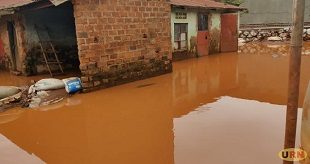
Kapchorwa, Uganda | Xinhua | As world leaders and experts meet in Egypt for a UN climate change conference, coffee farmers in eastern Uganda are grappling with the adverse effects of climate change that threaten their livelihood.
In the remote Chebonet village within the mountainous district of Kapchorwa, farmers are already paying the price. Janet Chekwoti told Xinhua in a recent interview that prolonged dry spells have come with diseases and pests which have affected her coffee garden.
“It has already threatened my income. It was in September when diseases attacked my garden, I had anticipated harvesting 600 kg, but all this was lost,” Chekwoti said.
“We are already noticing that coffee is very much at risk. That worries me because, with this climate change, we will be unable to produce coffee sustainably,” said Alfred Boyo Mashandich, another farmer in the neighboring Kween district.
“We should be thinking about climate-smart agriculture. What we should do is to ensure our farmers have the right knowledge and skills to produce coffee sustainably,” added Mashandich, who also runs a coffee company that buys from dozens of farmers.
For smallholder farmers like Chekwoti, they are uncertain of what is going to happen if these climate change effects persist.
Chekwoti chose to farm organic arabica coffee, which fetches premium prices. Since her coffee is organic, she was not supposed to spray pesticides and other chemicals, yet diseases are attacking her coffee trees. “We are looking for extension workers to guide us on how we shall fight these diseases.”
Chekwoti and Mashandich are part of a wider group of coffee farmers facing climate change’s effects.
Coffee is one of the major commodities prioritized by Uganda to boost economic transformation. According to the Uganda Coffee Development Authority (UCDA), a state-run regulatory authority, about 1.7 million households in the country depend on coffee production.
During the last financial year, which ended on June 30, 2022, Uganda exported 6.26 million bags of coffee worth 862.28 million U.S. dollars, compared to 6.08 million bags worth 559.16 million dollars in the previous financial year 2020/21, according to the UCDA.
 The Independent Uganda: You get the Truth we Pay the Price
The Independent Uganda: You get the Truth we Pay the Price



